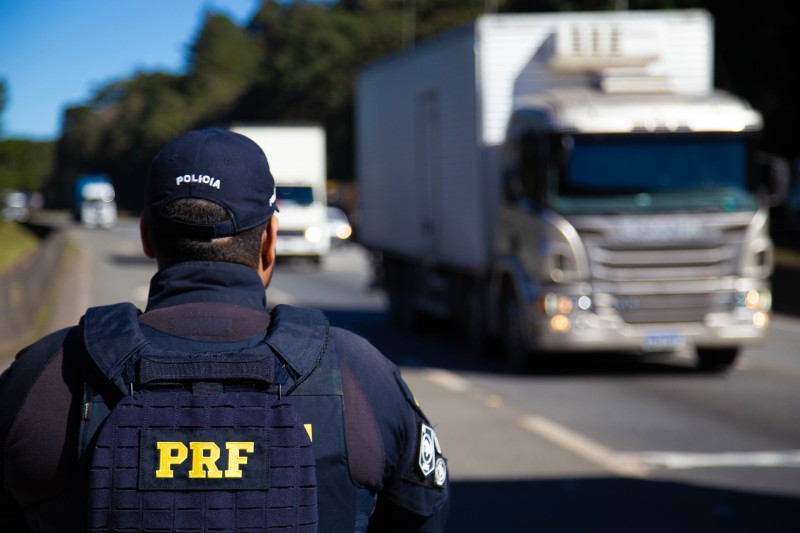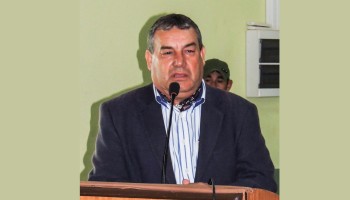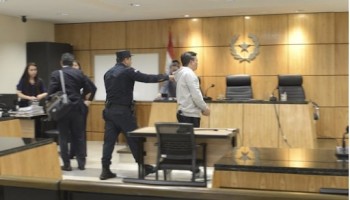Reported by
A federal Brazilian highway police officer was promoted in January despite being indicted for allegedly trafficking weapons from Paraguay into the hands of organized crime, according to court documents reviewed by OCCRP.
Though his name was never made public in connection with the case, officer Vagner Keith de Freitas was among more than two dozen suspects indicted following ‘Operation Dismantle’ — a March 2023 crackdown on an alleged arms and drug trafficking ring accused of moving more than 110 million reais (roughly $20 million at today’s exchange rate) since 2018.
According to the indictment, Freitas is charged with participating in a criminal organization, illegal arms dealing, and money laundering. He is awaiting trial.
Despite the pending charges, he has remained on active duty as a police officer, even receiving a promotion and salary increase in January for his “satisfactory performance” over the previous 12 months, according to official records.
In a statement to OCCRP, Brazil’s Federal Highway Police said an internal disciplinary process examining Freitas’ conduct was ongoing. The inquiry is confidential, the agency said, adding that there had been no court order requiring Freitas’ removal from active duty.
The lawyer representing Freitas and his wife — who has also been charged with illegal arms dealing, organized crime, and money laundering — said the allegations against his clients were “distorted” and “untrue.” He said Freitas had never committed a crime nor belonged to a criminal organization, and declined to answer further questions.
Police investigators allege that Freitas made frequent trips to Paraguay, where he sourced weapons and ammunition from at least two suppliers in Guairá. (One was later sentenced to prison in 2024 for trafficking arms to the paramilitary group Ejército del Pueblo Paraguayo).
Freitas would then allegedly sell the arms to a Brazilian gunsmith, Sérgio Pacheco, whose wife owned a shooting club in Greater São Paulo. According to police, Pacheco allegedly had a history of supplying weapons to organized crime groups and worked as a middleman who helped gun owners register their firearms with authorities.
Investigators cite messages between Freitas and Pacheco in which the two discuss the procurement of guns ranging from Glock G48 pistols to Colt AR rifles for the latter’s clients. In one conversation, Freitas offered a rifle at the “cost price” of $10,000, explaining that he would receive a Glock 17 as a commission for every two rifles sold, according to investigators.
According to the police documents, the weapons allegedly secured by Freitas and Pacheco were later sold to suspected drug traffickers in the northeastern state of Paraíba. The investigation found that Freitas received four deposits totaling 90,000 reais (around $16,300 at today’s exchange rate) from figures with alleged ties to the state's criminal underworld, including an individual associated with a leader of the Nova Okaida, the largest criminal and drug trafficking organization in Paraíba.
A lawyer for Pacheco — who was also charged with participating in a criminal organization, illegal arms dealing, association with drug trafficking, and money laundering — did not respond to requests to comment.
According to the investigation, Freitas was in possession of large sums of money: between 2018 and 2023, more than 10.7 million reais (around $1.9 million at today’s exchange rate) moved in and out of his accounts — roughly 13 times his declared salary during that period.
The officer's wife, Lígia Mariano Bachitchi, who investigators found has no formal employment, also allegedly carried out transactions involving more than three million reais (around $540,000) between 2018 and 2023. She is accused of helping manage bank accounts that paid the Paraguayan suppliers and received payments for the weapons, and for allegedly concealing the origin of her husband’s money.
Rafael Alcadipani, a researcher of organizational culture in police institutions at Brazil's Getulio Vargas Foundation (FGV), said “disciplinary actions must be taken more swiftly” in such cases.
“Highway police forces face serious corruption issues, given the volume of illegal goods that pass through. So we need a strong, active internal affairs department that is capable of resolving issues quickly.”
Aldo Benítez (OCCRP) contributed reporting.






